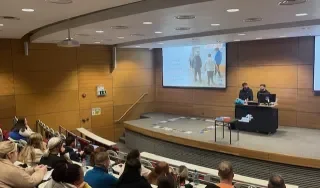Empowering Youth Through Awareness: Youth Work students complete training for The Grooming Awareness Programme (GAP)- A Gamified Intervention.
The team behind the BA in Community Youth Work and BA Hons in Youth Work Programmes recently provided students with training in grooming awareness of young people for criminal exploitation. This training was delivered by Bradog Youth Services with the aim of educating and encouraging youth workers to talk to young people about criminal exploitation using a gamified intervention.

The Grooming Awareness Programme (GAP), developed by Bradóg Youth Services, is a dynamic and interactive initiative aimed at educating young people about Child Criminal Exploitation (CCE), particularly in the context of drug-related crime. Delivered by Glen Kearney and his team, the programme uses gamified learning to foster engagement and dialogue among participants.
At its core, GAP is built around a board game that simulates real-life scenarios involving criminal grooming, decision-making, and consequences. Players navigate through choices that reflect the risks and realities of criminal involvement, such as money muling, drug trafficking, and intimidation. The game also highlights positive pathways, including education, youth services, and community support, encouraging resilience and informed decision-making.
As part of the training session with our Dundalk IT youth work students there was a theoretical input around legislation, rights-based youth work and evidence-based practices.
The programme can be tailored to be relevant to any and every community as it integrates local context by allowing participants to include familiar community locations in the game, making the experience more relatable and impactful.
GAP is informed by research from the Greentown Project, which explores how criminal networks influence youth offending in Ireland. It aligns with national and international policy frameworks, including the Engagement of Children in Criminal Activity Act 2024, which criminalises the recruitment of minors into illegal activities.
We would like to extend our thanks on behalf of the programme to Glen Kearney and Josh Kavanagh from Bradog Youth Service for delivering such a powerful and impactful training session. Our hope is that this training of student youth workers will result in competent and confident practitioners who will go on to deliver this gamified intervention with young people.